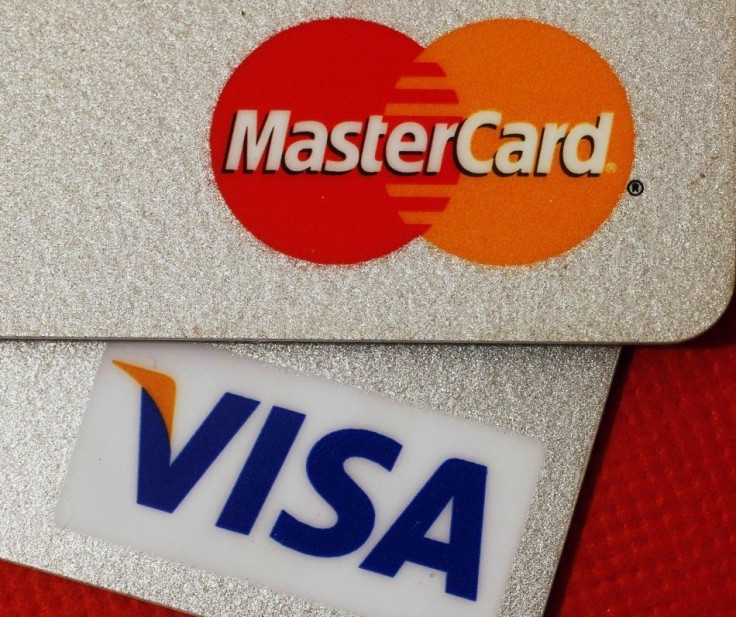MasterCard, Visa: Regulatory Overhang Causes Stock Price Weakness

As Congress rejected a delay in the implementation of debit card regulations for further study, RBC Capital Markets anticipates near term weakness in the shares of MasterCard Inc. (NYSE: MA) and Visa Inc. (NYSE: V) as it believes the consensus was for the delay to be approved.
"Given that MasterCard was perceived as a “winner” (less of loser) as the lack of exclusivity would allow the firm to take share from Visa, we would expect the weakness to be less in that name. We would, however, take advantage of this anticipated weakness as this does not represent a significant change in the status quo," said Daniel Perlin, an analyst at RBC Capital Markets.
In light of concerns over the impact of the Durbin Amendment to the Dodd-Frank Act, especially on smaller banks, there was an amendment presented to Congress to delay the implementation of new rules for debit cards. The rules revolve around two main issues: interchange/pricing limits, routing and exclusivity. The regulations were/are due to be enacted on July 21.
The Federal Reserve’s preliminary draft regulations called for capping interchange (the amount of money that the card-issuing financial institution receives) at $0.12 per transaction. On routing (determining which network a transaction is sent over), the Fed’s regulations allow merchant choice.
Perlin said while small banks and credit unions were exempted from the $0.12 limit, the point was raised by various groups (bank management, government officials, lobbyists, industry analysts, etc.) that these two regulations may work against small banks.
While a two-tiered interchange structure ($0.12 for large institutions, some higher level for small institutions) could be established (Visa has already said it would create such a structure), the merchant routing could drive traffic to the lowest interchange level -- $0.12 -- regardless of the size of the institution, Perlin said.
Perlin said two forms of the removing exclusivity (one network per card, e.g. Visa credit, signature debit and PIN debit) were proposed: one signature network and a different PIN network, or two choices for both signature and PIN debit.
Perlin believes that the former is the current consensus as having two signature networks does not logically make sense since there are only two such networks (MasterCard and Visa) and there is not a routing system to process two signature networks on the same card (clearly not impossible to create, just more costly).
Based on Perlin's draconian scenario the impact to Visa's net revenues and EPS for fiscal 2012 would be down 13 percent and down 20 percent, respectively. MasterCard’s corresponding reductions would be down 6 percent and down 11 percent for net revenues and EPS, respectively.
It’s important to keep in mind, in Perlin's opinion, that these estimates represent the most draconian scenario and do not take into consideration the potential mitigating factors which would likely offset the amount of the reduction or even that the reduction should not be proportional to the amount of the interchange reduction.
Although both Visa and MasterCard have contractual obligations with their respective bank clients, Perlin believes both would be willing to reduce the assessment fee (fee charged to the card-issuing bank for utilizing the branded network) at contract renewal.
Given the staggered nature of most contracts, the timing of such adjustments would help limit the immediate financial implications for each company. While reducing assessment fees on the one hand, Perlin believes Visa/MasterCard will likely increase processing fees (fees charged to the merchant processors) on the other, which should help offset the reduction in assessments.
Perlin said the bottom line is the consumer has to pay an annual fee that they never had to before to get the same benefit and the small merchant eats the brunt of the cost, while the large merchant reaps all the benefit and likely passes on none to the consumer.
"We estimate in total in the U.S. there are over 340 interchange categories between Visa and MasterCard. We could foresee a scenario whereby legislation changes focus from regulation of fees to creating more transparency of the categories," said Perlin.
Perlin said the idea behind creating transparency versus cutting fees is that it would make it harder for Visa and MasterCard to increase overall interchange in the aggregate with fewer categories to adjust and thus force fees down overtime as opposed to regulating the price today.
Perlin believes there are several other outcomes other than just pure regulation of fees such as Visa and MasterCard self regulate by adjusting fees down.
Under this scenario Perlin would argue that Visa and MasterCard would reduce both the interchange fees and categories for its most mature payment schemes (for example, a grocery store card present transaction), while at the same time increasing and expanding its fastest growing and highest risk categories (such Internet merchant). The end result over time, in his opinion, would be a higher weighted average interchange fee.
MasterCard stock closed Thursday's regular trading up 0.63 percent at $271.70 on the NYSE, while Visa stock closed down 0.37 percent at $76.43.
© Copyright IBTimes 2025. All rights reserved.





















